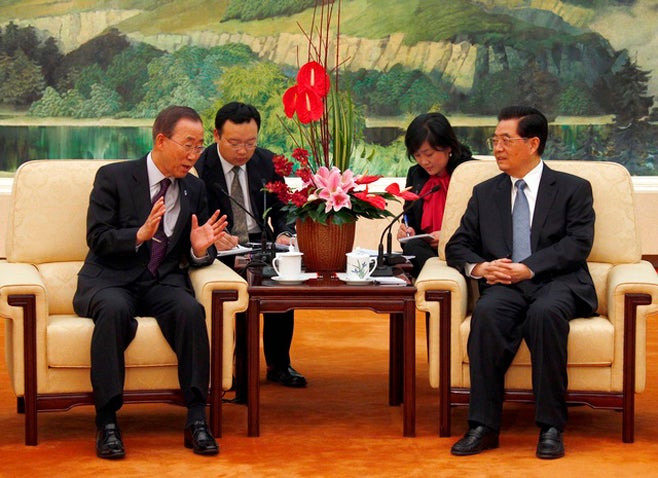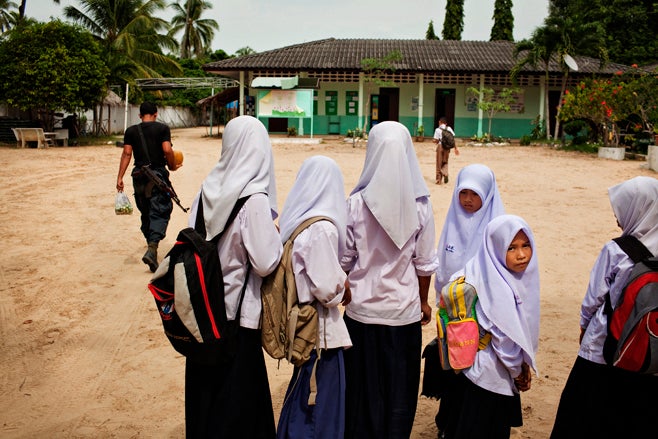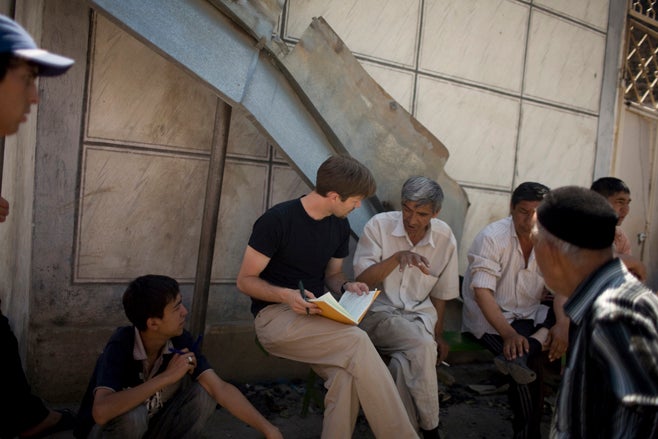Colombia's internal armed conflict continued to result in serious abuses by irregular armed groups in 2010, including guerrillas and successor groups to paramilitaries. Violence has displaced millions of Colombians internally, and displaces hundreds of thousands every year. Armed actors frequently threaten or attack human rights defenders, journalists, community leaders, trade unionists, indigenous and Afro-Colombian leaders, displaced persons' leaders, and paramilitaries' victims seeking land restitution or justice.
In August 2010 President Juan Manuel Santos replaced former President Alvaro Uribe, whose administration was racked by scandals over extrajudicial killings by the army, a highly questioned paramilitary demobilization process, and the national intelligence service's illegal surveillance of human rights defenders, journalists, opposition politicians, and Supreme Court justices. President Santos has promoted legislation to restore land to displaced persons and compensate victims of abuses by state agents, publicly voiced respect for an independent judiciary, and denounced threats against human rights defenders. However, it remains to be seen whether his approach translates into concrete results in light of serious ongoing abuses.
Guerrilla Abuses
The Revolutionary Armed Forces of Colombia (FARC) and the National Liberation Army (ELN) continue to carry out serious abuses against civilians. The FARC especially is often involved in killings, threats, forced displacement, and recruiting child combatants.
The FARC and ELN frequently use antipersonnel landmines. The government reported that 76 civilians were injured between January and August 2010 by antipersonnel landmines and unexploded munitions.
In September 2010 the Colombian military killed top FARC military commander Victor Julio Suárez, alias "Mono Jojoy," responsible for numerous grave abuses during his decades of leadership.
Paramilitaries and Their Successors
Since 2003 more than 30,000 individuals have participated in a paramilitary demobilization process, although there is substantial evidence that many were not paramilitaries, and that others never demobilized.
Successor groups to the paramilitaries, often led by mid-level commanders of demobilized paramilitary organizations, exercise territorial control in certain regions and are responsible for widespread atrocities against civilians. The Colombian National Police reported the groups had 3,749 members as of July 2010; however, the Colombian NGO Instituto de Estudios para el Desarrollo y la Paz estimates the groups have 6,000 armed combatants, and have expanded operations to 29 of Colombia's 32 departments. Toleration of these successor groups by members of the public security forces is a main factor in their growth.
Like previous paramilitaries, the groups engage in drug trafficking, actively recruit, and commit widespread abuses, including massacres, killings, rapes, and forced displacement. Successor groups repeatedly target human rights defenders, trade unionists, and victims groups seeking justice and recovery of land. In Medellín homicides have surged since 2008, apparently due to these groups.
Successor groups contribute significantly to forced displacement. State agencies often refuse to register people as displaced if they say paramilitary successor groups forced them to flee, contributing to disparities between government and NGO estimates of Colombia's internally displaced population. While the state agency Social Action registered 154,040 newly displaced in 2009, the respected Colombian NGO CODHES holds that 286,389 persons were displaced that year. Social Action has registered 3.3 million displaced persons between 1997 and July 2010, compared to 3.9 million that CODHES reports between 1997 and 2009.
Colombia's Supreme Court has in recent years made considerable progress investigating Colombian Congress members accused of collaborating with paramilitaries. In the "parapolitics" scandal, more than 150 Congress members - most from President Uribe's coalition - have been investigated, and at least 20 convicted. The Uribe administration repeatedly took actions that could have sabotaged investigations, including issuing public and personal attacks against Supreme Court justices. President Santos has publicly stated his commitment to respecting the court's independence.
The Supreme Court is currently investigating more than 20 members of Congress amid concerns of high levels of paramilitary infiltration. Investigations by the Attorney General's Office into senior military officers and businesspersons who allegedly collaborated with paramilitaries have been slow.
Implementation of the Justice and Peace Law, which offers dramatically reduced sentences to demobilized paramilitaries who confess their atrocities, has also been slow and uneven. As of November 2010, more than five years after the law was approved, there have only been two convictions and prosecutors have recovered a negligible fraction of the millions of acres of land that paramilitaries seized. The Santos government has promoted legislation to return millions of acres of land to Colombia's displaced population through a procedure separate from the Justice and Peace Law.
Paramilitary leaders' confessions in the justice and peace process suffered a setback when President Uribe extradited most paramilitary leaders to the United States between May 2008 and August 2009 to face drug trafficking crimes. Paramilitary cooperation declined significantly thereafter, and several commanders refused to continue testifying, fearing reprisals against family in Colombia.
Military Abuses and Impunity
In recent years Colombia's Army has been blamed for an alarming number of extrajudicial killings of civilians, including extrajudicial executions known as "false positives," when army members, pressured to show results, kill civilians and report them as combatants killed in action. The alleged executions have occurred throughout Colombia and involve multiple army brigades.
The problem continues, despite a significant drop in false positives since 2009. The government does not keep statistics for such cases, but as of May 2010, the Attorney General's Office was investigating 1,366 cases of alleged extrajudicial killings committed by state agents involving more than 2,300 victims. There have only been rulings in 63 cases.
The military justice system's resistance to transferring cases to ordinary civilian courts impeded prosecution of extrajudicial killings. Military courts transferred 266 cases in 2009 but only seven from January to September 2010.
Violence against Trade Unionists
Colombia still leads the world in killings of trade unionists, with more than 2,800 reported killings since 1986, according to the National Labor School (ENS), Colombia's leading NGO monitoring labor rights. Most are attributed to paramilitaries and their successor groups.
While the number of murders dropped in 2007 to 39, statistics are still alarmingly high: 52 murders in 2008, 47 in 2009, and 36 from January to September 15, 2010, according to the ENS. Threats against unionists-mostly attributed to paramilitaries' successor groups-have increased since 2007.
Impunity in such cases is widespread: only 25 percent of more than 2,800 ENS-documented killings of unionists are being investigated by the Attorney General's Office unit mandated to prosecute such crimes. The office has opened investigations into more than 1,300 cases of anti-union violence (including several hundred that do not appear on the ENS list), but has only obtained convictions in 14 percent of these cases. There are also concerns the investigations are piecemeal, and do not consider whether the victim's union activities motivated the crime.
Human Rights Defenders
Human rights defenders are routinely threatened and attacked. According to the NGO Somos Defensores, seven defenders were murdered and 51 threatened in the first half of 2010. A coalition of Colombian and international NGOs reported 30 killings of human rights defenders and social leaders between July and October 15, 2010. Over 40 leaders of victims groups seeking to recover land have been killed since the Justice and Peace process started in 2005. In 2010 several leaders of Afro-Colombian and indigenous communities were reported killed. Impunity for these crimes contributes to their persistence.
President Santos has publicly condemned threats against human rights defenders-an improvement from their stigmatization during President Uribe's administration.
The Early Warning System of the Ombudsman's Office, which monitors Colombia's human rights situation, regularly issues "risk reports" warning of threats to communities and individuals. Other Colombian authorities have sometimes ignored these and failed to act to prevent abuses.
Illegal Surveillance
In February 2009 Colombia's leading news magazine, Semana, reported the Colombian intelligence service, DAS, which answers directly to the president's office, had for years engaged in extensive illegal phone tapping, email interception, and surveillance directed at trade unionists, human rights defenders, journalists, opposition politicians, and Supreme Court justices. DAS documents indicate the alleged criminal activities included death threats and smear campaigns to link targets to guerrillas. The Attorney General's Office has begun investigating dozens of former and current DAS officials, including the current director and several of his predecessors.
Former DAS functionaries say that high-level officials in the Uribe administration may have ordered the illegal surveillance. In October 2010 the Inspector General's Office meted out disciplinary sanctions against President Uribe's chief-of-staff and three former DAS directors for their part in the surveillance.
Key International Actors
The United States remains the most influential foreign actor in Colombia. In 2010 it provided approximately US $673 million-mostly military and police aid-though an increasing percentage consists of social and economic assistance. Thirty percent of US military aid is subject to human rights conditions, which the US Department of State has not consistently enforced. In September 2010 the State Department certified, for the second time under President Barack Obama's administration, that Colombia was meeting human rights conditions. However, the State Department's 2010 certification did include a comprehensive memorandum outlining Colombia's significant human rights problems.
The US Congress has delayed ratifying the US-Colombia Free Trade Agreement until there is "concrete evidence of sustained results on the ground" regarding impunity for violence against trade unionists and the role of paramilitaries.
The United Kingdom reportedly reduced military assistance to Colombia in 2009, apparently due to scandals over illegal surveillance and extrajudicial executions. The European Union provides social and economic assistance to Colombia, including some aid to the government's paramilitary demobilization programs.
The Organization of American States' Mission to Support the Peace Process in Colombia, charged with verifying paramilitary demobilizations, issued reports in 2009 and 2010 expressing alarm over the activities of paramilitary successor groups.
The Office of the Prosecutor of the International Criminal Court continued to monitor local investigations into human rights crimes. The Office of the United Nations High Commissioner for Human Rights is active in Colombia, and has arranged to monitor the military's internal control structure. In October 2010 Colombia's Congress approved the International Convention for the Protection of All Persons from Enforced Disappearance. It would go into effect after being signed by President Santos and upheld by the Constitutional Court.




